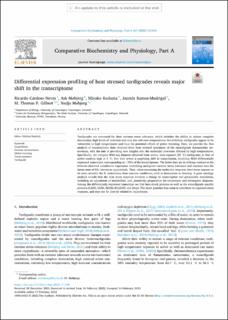Differential expression profiling of heat stressed tardigrades reveals major shift in the transcriptome
Neves, Ricardo A. Cardoso; Møbjerg, Ask; Kodama, Miyako; Ramos-Madrigal, Jazmín; Gilbert, Marcus Thomas Pius; Møbjerg, Nadja
Peer reviewed, Journal article
Published version
Permanent lenke
https://hdl.handle.net/11250/3104688Utgivelsesdato
2022Metadata
Vis full innførselSamlinger
- Institutt for naturhistorie [1213]
- Publikasjoner fra CRIStin - NTNU [37228]
Sammendrag
Tardigrades are renowned for their extreme stress tolerance, which includes the ability to endure complete desiccation, high levels of radiation and very low sub-zero temperatures. Nevertheless, tardigrades appear to be vulnerable to high temperatures and thus the potential effects of global warming. Here, we provide the first analysis of transcriptome data obtained from heat stressed specimens of the eutardigrade Ramazzottius varieornatus, with the aim of providing new insights into the molecular processes affected by high temperatures. Specifically, we compare RNA-seq datasets obtained from active, heat-exposed (35 °C) tardigrades to that of active controls kept at 5 °C. Our data reveal a surprising shift in transcription, involving 9634 differentially expressed transcripts, corresponding to >35% of the transcriptome. The latter data are in striking contrast to the hitherto observed constitutive expression underlying tardigrade extreme stress tolerance and entrance into the latent state of life, known as cryptobiosis. Thus, when examining the molecular response, heat-stress appears to be more stressful for R. varieornatus than extreme conditions, such as desiccation or freezing. A gene ontology analysis reveals that the heat stress response involves a change in transcription and presumably translation, including an adjustment of metabolism, and, putatively, preparation for encystment and subsequent diapause. Among the differentially expressed transcripts we find heat-shock proteins as well as the eutardigrade specific proteins (CAHS, SAHS, MAHS, RvLEAM, and Dsup). The latter proteins thus seem to contribute to a general stress response, and may not be directly related to cryptobiosis.

